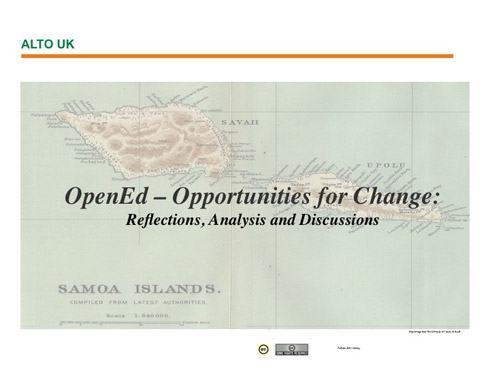OpenEd – Opportunities for Change: Reflections, Analysis and Discussions
John Casey, University of the Arts London
This is a generic presentation about how OER engagement might be used as a driver for change; it examined some of the factors this involved including some of the political agendas involved. John Casey presented because Alison Harley Chair and Head of School of Textiles and Design, Heriot-Watt University, was unfortunately unable to attend.
This is a generic presentation about how OER engagement might be used as a driver for change; it examined some of the factors this involved including some of the political agendas involved.
Biography
John Casey is the project manager of the ALTO UK JISC OER Phase 3 project (http://alto.arts.ac.uk) based at the University of the Arts London. This is notable in being a partnership between the public and private sector that includes universities, technical colleges, publishers and IT companies. The vision of the project partners is to develop a service to support a sustainable ADM OER community in the UK that is engaged in the co-design, development and sharing of OERs. To support this, the project is developing a technical infrastructure for a national online/offline community of art, design and media teachers and students. Previously, John was project manager for the Jorum project (http://www.jorum.ac.uk/) where he was instrumental in guiding Jorum to becoming an open repository service and in the adoption of Creative Commons Licences. John has experience in the legal issues and staff development aspects of e-learning and has researched and published on these subjects.
John Casey presented because Alison Harley was unfortunately unable to attend.
Her planned presentation was as follows:
Experimental methods and approaches to the development of learning materials in Fashion Communication, and Woven Textiles for open source learning in creative practice
Alison Harley
Chair and Head of School of Textiles and Design, Heriot-Watt University
The ALTO (Arts Learning and Teaching Online) project in the School of Textiles and Design is focused on two distinctive specialist subject areas of creative practice – Fashion Communication that draws on the studio environment, digital communication and ‘location’ learning; and the ‘endangered subject’ of Woven Textiles that is dependent on the transfer of knowledge through traditional practice in a workshop situation. An account of the experimental approaches and methods used in the development of open source learning materials for both subject areas will be presented, alongside the challenges and perceptions of an emerging area of learning and teaching in design higher education.



